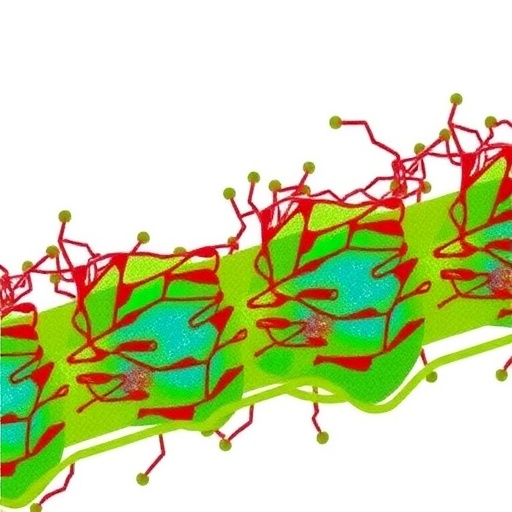In a groundbreaking study published in the prestigious journal BMC Cancer, researchers have unveiled compelling evidence linking Cathepsin C (CTSC) to the progression and metastatic behavior of non-small cell lung cancer (NSCLC). This work not only sheds light on the intricate molecular dynamics within the tumor microenvironment but also positions CTSC as a promising target for innovative therapeutic strategies aimed at improving outcomes for NSCLC patients worldwide.
Non-small cell lung cancer continues to be one of the leading causes of cancer-related mortality globally, with its complex biology and propensity for metastasis making effective treatment a persistent challenge. The proteolytic enzyme CTSC, a cysteine protease predominantly located in lysosomes, has long been recognized for its role in immune regulation, but its influence on cancer progression has only recently garnered focused scientific attention.
The study reveals that CTSC is significantly upregulated in NSCLC tissues compared to normal counterparts, marking a critical distinction that correlates strongly with poorer overall survival in patients. This correlation suggests that CTSC may not be a mere bystander in cancer biology but an active participant in creating an aggressive tumor phenotype that fosters both growth and dissemination.
Employing cutting-edge single-cell RNA sequencing (scRNA-seq), the research team meticulously mapped the cellular expression landscape of CTSC within the NSCLC microenvironment. Remarkably, CTSC expression was predominantly localized not only in malignant epithelial cells but also in key immune cell subsets including natural killer (NK) cells, M1 and M2 macrophages, and neutrophils. This diverse expression pattern hints at a multifaceted role for CTSC, intertwining tumor biology with immune modulation.
To delve deeper into the functional implications, gene set enrichment analysis (GSEA) was performed, unveiling CTSC’s involvement in orchestrating immune responses. The investigators harnessed several sophisticated computational algorithms—ssGSEA, CIBERSORT-abs, QUANTISEQ, and XCELL—to quantify immune cell infiltration and discern interactions within the tumor milieu. These analyses converged on a robust positive association between elevated CTSC levels and infiltration of M2 macrophages, a subset known for promoting immunosuppression and tumor progression.
Further substantiating these bioinformatic findings, the study demonstrated strong co-expression of CTSC with canonical M2 macrophage marker genes such as CD68 and CD163, as well as with established immune checkpoint molecules. The co-localization of CTSC and these markers underscores its likely role in fostering an immunosuppressive microenvironment that aids tumor evasion from immune surveillance.
Translating these molecular insights into clinical relevance, the investigators employed immunohistochemistry techniques to evaluate CTSC, CD68, and CD163 protein expression within a cohort of NSCLC patient samples. The histological data reinforced the interplay between CTSC expression and M2 macrophage infiltration, consolidating CTSC’s role in tumor-immune crosstalk within the human disease context.
To unravel the mechanistic impact of CTSC on tumor biology, functional assays were conducted in vitro using NSCLC cell lines. Silencing CTSC expression led to a pronounced reduction in cellular proliferation and migratory capacity, indicative of its vital role in driving tumor growth and metastatic potential. Conversely, forced overexpression of CTSC amplified these malignant phenotypes, further reinforcing its status as a key oncogenic modulator.
Extending their exploration in vivo, the research team utilized animal models to observe the consequences of CTSC manipulation on tumor progression and metastasis. Consistent with in vitro findings, diminished CTSC expression resulted in markedly restrained tumor growth and reduced metastatic dissemination, highlighting the therapeutic promise of targeting CTSC pathways.
This study represents a significant advance in cancer biology by positioning CTSC at the nexus of tumor progression, immune modulation, and metastasis in NSCLC. The dual role of CTSC—in promoting aggressive tumor characteristics and in orchestrating immunosuppressive macrophage infiltration—presents a compelling target for novel intervention strategies.
Targeting CTSC could potentially disrupt the pro-tumoral dialogue between cancer cells and the immune microenvironment, reactivating anti-tumor immunity and halting disease progression. The research paves the way for the development of CTSC inhibitors or combined immunotherapeutic approaches that could significantly improve patient prognosis and quality of life.
Moreover, the integration of diverse bioinformatics tools alongside experimental validation strengthens the robustness of these findings, exemplifying the power of multi-omic methodologies in contemporary cancer research. This integrative approach could serve as a blueprint for studying other proteases and immune modulators involved in cancer.
The findings underscore the importance of focusing on the tumor microenvironment’s immune components, particularly M2 macrophages, which are increasingly recognized as pivotal players in the malignant ecosystem. By elucidating the functional interdependence between CTSC and these macrophages, the study enhances our understanding of how tumors sculpt their surroundings to favor survival and expansion.
As the scientific community continues to unravel the complexities of NSCLC, studies like this highlight potential biomarkers for patient stratification and therapeutic targeting. CTSC’s expression profile may serve as a prognostic indicator as well as a predictive marker for response to emerging immunotherapies.
In conclusion, this seminal study elevates Cathepsin C from a lesser-known lysosomal protease to a central figure in NSCLC pathogenesis. By revealing its role in promoting M2 macrophage infiltration and facilitating tumor growth and metastasis, the work opens exciting avenues for research and clinical intervention aimed at conquering one of the most formidable cancers.
The journey from bench to bedside for CTSC-centered therapies may redefine future paradigms in lung cancer management, offering hope to millions affected by this devastating disease.
Subject of Research: Cathepsin C’s role in tumor progression and immune modulation in non-small cell lung cancer (NSCLC).
Article Title: Cathepsin C correlates with M2 macrophage infiltration and regulates the tumor growth and metastasis in non-small cell lung cancer.
Article References:
Tong, X., Zhu, T., Ma, L. et al. Cathepsin C correlates with M2 macrophage infiltration and regulates the tumor growth and metastasis in non-small cell lung cancer. BMC Cancer 25, 1001 (2025). https://doi.org/10.1186/s12885-025-14341-3
Image Credits: Scienmag.com




